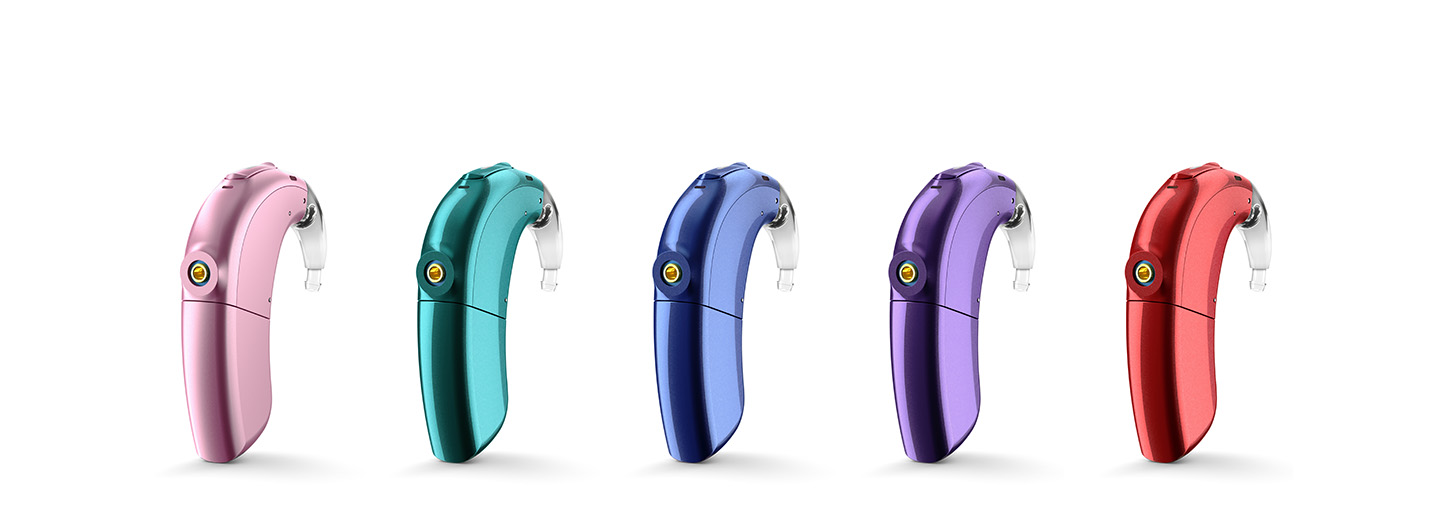Sometimes a small but very important detail like the device color can allow them to express their personality and go bold.
Table of Contents
- Learn about hearing technology together
- Choose hearing devices that best fit your teen’s needs and lifestyle
- Encourage them to search for blogs, websites, forums, and support groups
- Find resource pages specifically created to fulfil their needs as teens
- Encourage your teen to prepare and take the lead during appointments with the audiologist
How Parents can Empower Teens in Their Hearing Journey
If you are the parent of a teenager with hearing loss, you probably remember the beginning of the journey you embarked on when your child got diagnosed. You asked questions around speech recognition and development, you learned about hearing technology, you visited the audiologist, you equipped your child for school and extracurricular activities, and celebrated major milestones. Parents want the best for their children and inevitably remain their biggest advocates for life.
As a teenager, your child will continue their own path into adulthood—and an important part of this transition is letting them become independent. As a parent, it’s important to think about how you can best support them in taking ownership of their hearing journey, and about advocating for themselves. While there is no right or wrong way for parents to guide kids throughout this process, here are some ways to empower your teen to make decisions and manage their hearing loss with confidence.

Learn about hearing technology together
Technology in hearing aids, cochlear implants, and assistive devices evolve so fast. Ask your kid’s hearing care professional about the newest devices and features. For example, ask how accessories such as the Roger™ microphone can help in various situations where your kid struggles. Engineers, audiologists and researchers dedicated a lot of hours in order to develop new features that will improve people’s hearing and ultimately their well-being. Keeping abreast of the latest features and devices available gives you and your teen the opportunity to benefit from ever-improving solutions.
Choose hearing devices that best fit your teen’s needs and lifestyle

When your teenage son or daughter is asking about choosing new hearing technology, consider their lifestyle and what devices best suit their needs. If they spend many hours of their day streaming phone calls, videos, or music, they should look into a technology that offers the best connectivity options, and for both ears when there’s hearing loss in both. If your teen is into water or outdoor sports, consider reliable, robust, and water resistant or waterproof technology. Sometimes a small but very important detail like the device color can allow them to express their personality and go bold. Discuss the choices and their pros and cons with your teen, and when appropriate, let them make the final decision. After all, they will be the ones wearing the chosen device every day.
Encourage them to search for blogs, websites, forums, and support groups
It has never been so easy for people to share their experiences online. It is now a part of our daily lives to look for product tutorials, reviews, or advice on online platforms. Finding the right channels where teens can get some support from other people with hearing loss is highly recommended. Besides blogs like this one where they can read stories from other CI wearers, the HearingJourney online forum is a vibrant, free, online cochlear implant community where members can chat, share stories, and learn from each other.
To connect with individuals with hearing loss in general, your teen can visit websites like Hearing Like Me, one of the largest online communities where hEARos talk freely about certain topics, address concerns, ask all kinds of questions, share tips, and also their passions, be they sports, fashion, art, traveling, etc.
Find resource pages specifically created to fulfil their needs as teens
In the big ocean of data called the Internet, we easily lose a lot of our time trying to find information that is relevant. It is no different when one is trying to find resources for teens with hearing loss. One might find many more resources for smaller children. But finding useful resources that truly speak the teens’ language and are dedicated to their specific needs are rare. Phonak has a dedicated page for teen resources that was created by teens for other teens. Another useful teen-specific resource is the Guide to Access Planning, a thorough set of resources created by educational audiologists for teens. Phonak and Advanced Bionics also joined forces to create a rehabilitation portal called Hearing Success with helpful tools.
But finding useful resources that truly speak the teens’ language and are dedicated to their specific needs are rare.
Encourage your teen to prepare and take the lead during appointments with the audiologist
Throughout childhood, it is normal for parents to lead the discussions with doctors and audiologists. But when your child turns 18, they will be the one asking questions, addressing concerns, and setting up appointments for their hearing care. Therefore, motivating teens to prepare for their audiologist appointments is a great way to foster their independence and allow them to take this step into their adulthood. The Phonak Teen Advisors prepared a set of questions that teens can ask their audiologist during appointments.
Empowering children helps them develop their skills and strengths, and become more aware of who they are and how to find their role in society. It also makes them more responsible and self-reliant. Letting them know that they can always count on their parents for support, but slowly preparing them to become independent, so they can pave their own way, is one of the best gifts parents can give!
